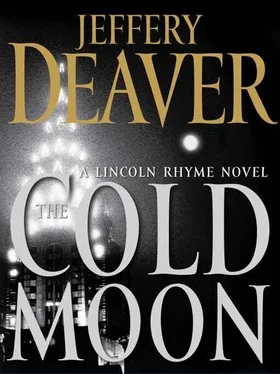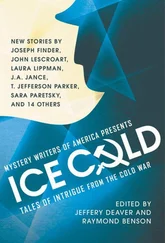
Their new car was a Buick LeSabre.
"Where'd you get it?" Vincent asked Duncan as he climbed into the passenger seat. The car sat idling at the curb in front of the church.
"The Lower East Side." Duncan glanced at him. "Nobody saw you?"
"The owner did. Briefly. But he's not going to be saying anything." He tapped his pocket, where the pistol rested. Duncan nodded toward the corner where he'd slashed the student to death earlier. "Any police around?"
"No. I mean, I didn't see any."
"Good. Sanitation probably picked up the Dumpster and the body's halfway out to sea on a barge."
Slash their eyes…
"What happened at the garage?" Vincent asked.
Duncan gave a slight grimace. "I couldn't get close to the Explorer. There weren't that many cops, but some homeless man was there. He was making a lot of noise and then I heard shouting and cops started running into the place. I had to leave."
They pulled away from the curb. Vincent had no idea where they were going. The Buick was old and smelled of cigarette smoke. He didn't know what to call it. It was dark blue but "Blue-mobile" wasn't funny. Clever Vincent wasn't feeling very witty at the moment. After a few minutes of silence he asked, "What's your favorite food?"
"My-?"
"Food. What do you like to eat?"
Duncan squinted slightly. He did this a lot, considered questions seriously and then recited the answers he'd planned out. But this one flummoxed him. He gave a faint laugh. "You know, I don't eat that much."
"But you must have some favorite."
"I've never thought about it. Why're you asking?"
"Oh, just, I was thinking I could make us dinner sometime. I can cook a lot of different things. Pasta-you know, spaghetti. Do you like spaghetti? I make it with meatballs. I can make a cream sauce. They call that Alfredo. Or with tomato."
The man said, "Well, I guess tomato. That's what I'd order in a restaurant."
"Then I'll make that for you. Maybe if my sister's in town, I'll have a dinner party. Well, not a party. Just the three of us."
"That's…" Duncan shook his head. He seemed moved. "Nobody's made me dinner since…Well, nobody's made me dinner for a long time."
"Next month, maybe."
"Next month could work. What's your sister like?"
"She's a couple years younger than me. Works in a bank. She's skinny too. I don't mean you're skinny. Just, you know, in good shape."
"She married, have kids?"
"Oh, no. She's really busy at her job. She's good at it."
Duncan nodded. "Next month. Sure, I'll come back to town. We could have dinner. I couldn't help you. I don't cook."
"Oh, I'd do the cooking. I like to cook. I watch the Food Channel."
"But I could bring some dessert. Something already made. I know you like your sweets."
"That'd be great," said an excited Vincent. He looked around the cold, dark streets. "Where're we going?"
Duncan was silent for a moment. He eased the car to a stoplight, the front wheels precisely on the dirty, white stop line. He said, "Let me tell you a story."
Vincent looked over at his friend.
"In seventeen fourteen the British Parliament offered twenty thousand pounds to anyone who could invent a portable clock accurate enough to be used at sea."
"That was a lot of money then, right?"
"Huge amount of money. They needed a clock for their ships because every year thousands of sailors died from navigational errors. See, to plot a course you need both longitude and latitude. You can determine latitude astronomically. But longitude needs accurate time. A British clockmaker named John Harrison decided to go for the prize. He started working on the project in seventeen thirty-five and finally created a small clock that you could use on a ship and that lost only a few seconds over the course of an entire transatlantic voyage. When did he finish? In seventeen sixty-one."
"Took him that long?"
"He had to cope with politics, competition, conniving businessmen and members of Parliament and, of course, the mechanical difficulties-almost impossibilities-of creating the clock. But he never stopped. Twenty-six years."
The light changed to green and Duncan accelerated slowly. "In answer to your question, we're going to see about the next girl on our list. We had a setback. But nothing's going to stop us. It's not a big deal-"
"In the great scheme of things."
A brief smile crossed the killer's face.
"First of all, they have security cameras in the garage?" Rhyme asked.
Sellitto's laugh meant "in your dreams."
He, Pulaski and Baker were back in Rhyme's town house, going over what the rookie had collected in the garage. The homeless man who'd attacked Pulaski was in Bellevue. He had no connection to the case and was diagnosed as a paranoid schizophrenic off his meds.
"Wrong time, wrong place," Pulaski had muttered.
"You or him?" Rhyme'd responded. He now asked, "Security cameras at the impound where he boosted the SUV?"
Another laugh.
A sigh. "Let's see what Ron found. First, the bullets?"
Cooper brought the box to Rhyme and opened it for him.
A.32-caliber ACP bullet is an uncommon round. The semiautomatic pistol bullet has more range than the smaller.22 but not much stopping power, like the more powerful.38 or 9-millimeter. Thirty-twos have traditionally been called ladies' guns. The market is somewhat limited but is still quite large. Finding a compatible.32 in the possession of a suspect could be circumstantial evidence that he was the Watchmaker but Cooper couldn't just ring up local gun stores and get a short list of who'd been buying these rounds lately.
Since seven were missing from the box, and the Autauga MkII pistol holds seven in a full clip, that was Rhyme's best guess for the weapon, but the Beretta Tomcat, the North American Guardian and the LWS-32 were also chambered for those slugs. The killer could be carrying any of them. (If he was armed at all. Bullets, Rhyme pointed out, suggest but don't guarantee that the suspect carried or owned a gun.)
Rhyme noted that the slug was a 71-grain, big enough to do very serious damage if it was fired at close range.
"On the board, rookie," Rhyme commanded. Pulaski wrote as dictated.
The book he'd found in the Explorer was entitled Extreme Interrogation Techniques and had been published by a small company in Utah. The paper, printing job and typography-not to mention the style of writing-were third-rate.
Written by an anonymous author who claimed he'd been a Special Forces soldier, the book described using torture techniques that would ultimately result in death if the subject didn't confess-drowning, strangulation, suffocation, freezing in cold water and others. One involved suspending a weight above a subject's throat. Another, cutting his wrists and letting him bleed until he confessed.
"Christ," Dennis Baker said, wincing. "It's his blueprint… He's going to kill ten victims like that? Sick."
"Trace?" Rhyme asked, concerned more about the forensic implications of the book than the psychological makeup of its purchaser.
Holding the book over a large sheet of clean newsprint, Cooper opened every page and dusted each one to dislodge trace. Nothing fell out.
No fingerprints either, of course.
Cooper learned that the book wasn't sold through the major Web-based or retail bookstore chains-they refused to carry it. But it was readily available through online auction companies and a number of right-wing, paramilitary organizations, which sold everything you needed to protect yourself from the scourge of minorities, the foreign-born and the U.S. government itself. (In recent years Rhyme had consulted on a number of terrorist investigations; many had been linked to al-Qaeda and other fundamentalist Islamic groups but just as many had involved domestic terrorism-a threat he himself felt was being largely ignored by authorities in this country.)
Читать дальше













